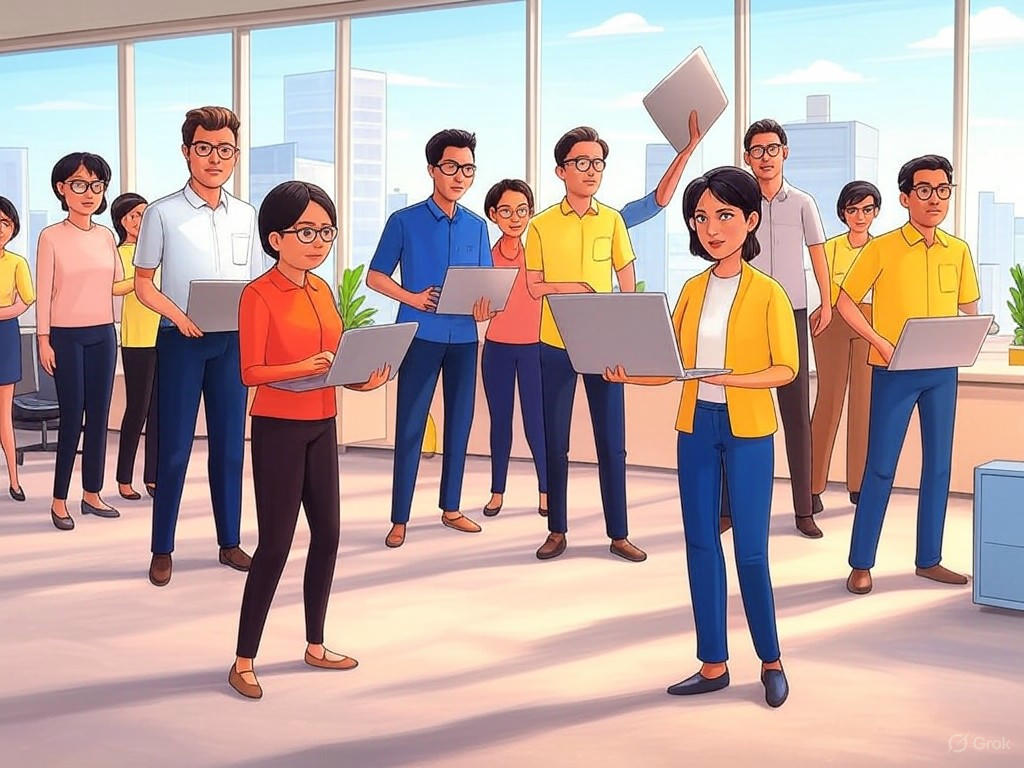
AI Workplace Challenges: How AI Is Transforming Jobs
Navigating AI Workplace Challenges in Today’s Evolving Jobs
AI workplace challenges are reshaping how we work, blending innovation with uncertainty as we head into 2025. Think about it: Artificial Intelligence is no longer just a buzzword—it’s a daily reality, automating tasks and sparking new ways for businesses to thrive. But this rapid shift brings both excitement and hurdles, from the need for reskilling to ethical dilemmas that could affect jobs worldwide.
Have you noticed how AI tools are already handling routine chores, freeing up time for more creative pursuits? Yet, as AI adoption accelerates, we’re seeing a mix of job creation and potential displacement. A key report highlights that by 2025, AI could transform industries, pushing workers to adapt quickly to stay ahead.[2] Addressing these AI workplace challenges head-on is essential for a balanced future.
How AI Workplace Challenges Are Reshaping the Job Landscape
One of the biggest AI workplace challenges involves job displacement, but it’s not all negative—AI is also opening doors to fresh opportunities. For instance, while automation might replace repetitive roles, it’s fueling demand for skills in areas like data analysis and creative problem-solving. Recent data suggests that around 300 million jobs globally could be impacted, yet this same wave is expected to generate 133 million new positions by 2025.[6]
Imagine a factory worker whose routine tasks are automated; suddenly, they need to learn coding or AI management to evolve. In advanced economies, about 60% of jobs face exposure, compared to just 26% in lower-income regions.[2] This disparity highlights a core AI workplace challenge: ensuring equitable access to upskilling. Industries like manufacturing are hit hard, while fields such as healthcare are booming, using AI for diagnostics and personalized care.
- By 2025, AI might displace 75 million jobs but create even more, emphasizing the need for adaptive strategies.[6]
- What if your industry is next? Workers in education could pivot to AI-enhanced learning tools, turning potential threats into career boosts.
- Here’s a tip: Start exploring online courses in critical thinking and AI basics to future-proof your role.
Addressing Key AI Workplace Challenges: Job Security and Ethical Issues
Concerns about AI workplace challenges often center on job security and privacy, with surveys showing that 52% of U.S. workers worry about their future prospects.[3] It’s a valid fear—AI’s role in decision-making raises questions about fairness and accuracy. For example, if AI systems make hiring choices, biases could creep in, affecting diverse candidates.
Ever thought about how your data is used in AI algorithms? Cybersecurity tops the list for many, with 51% of employees highlighting it as a major issue.[1] Other AI workplace challenges include inaccuracies in AI outputs, intellectual property risks, and regulatory hurdles. How can companies build trust? By prioritizing transparency and ethical guidelines, they can mitigate these problems.
- Cybersecurity risks aren’t just tech woes—they impact daily work, making it crucial to implement strong protections.[1]
- AI bias in hiring is another hurdle; adopting fairness checks could reduce unfair practices by up to 40%.[5]
- A quick strategy: Encourage your team to question AI recommendations and seek human oversight for key decisions.
The Urgent Need for Upskilling Amid AI Workplace Challenges
As AI transforms jobs, one of the most pressing AI workplace challenges is the skills gap. A recent survey revealed that 36% of workers see this as their top issue, closely followed by the need for upskilling.[4] It’s like trying to run a race with outdated gear—without the right training, staying competitive becomes tough.
Organizations are stepping up, with 80% using AI to predict and address skills shortages.[5] Over the next few years, millions will retrain for AI-related careers. But barriers persist: Many workers struggle to integrate AI into their routines, and budget limits slow progress. Have you considered how upskilling could redefine your career path?
Overcoming Barriers in AI Workplace Challenges for Effective Training
- About 40% of employees find it hard to apply AI in everyday tasks—starting with simple tools like chatbots can build confidence.[4]
- Anecdote: A marketing team I know turned things around by hosting weekly AI workshops, turning skeptics into experts.
- To tackle this, focus on accessible resources; for instance, free online platforms offer courses tailored to beginners.
Unlocking Opportunities Despite AI Workplace Challenges
While AI workplace challenges dominate discussions, the technology’s benefits are undeniable. AI can automate mundane tasks, letting employees dive into more fulfilling work, like strategic planning or innovation. In healthcare, for example, AI assists with diagnostics, improving accuracy and speed.
Picture a finance analyst using AI for data crunching, freeing up time for client interactions—that’s real empowerment. Companies embracing these changes report boosts in productivity and engagement.[6] So, how can you leverage AI without fear? By viewing it as a partner, not a threat.
- AI enhances quality control in manufacturing, spotting defects faster than ever.[6]
- Digital assistants streamline HR processes, making onboarding smoother and more efficient.[5]
- Actionable advice: Experiment with AI tools in your workflow and track the results to see tangible improvements.
Ethical and Regulatory Aspects of AI Workplace Challenges
Ethical considerations are at the heart of many AI workplace challenges, especially as AI influences HR and operations. With 67% of HR leaders focusing on ethical AI, companies are forming ethics committees to guide implementation.[5] This isn’t just compliance—it’s about building a fairer workplace.
By 2025, we might see 80% of organizations adopting these committees, tackling issues like bias and transparency. What does this mean for you? It could mean fairer job opportunities and reduced risks in AI-driven decisions. Still, challenges like explainability persist, with half of companies expecting struggles.[5]
- Bias detection tools promise to cut unfair practices, fostering inclusivity.[5]
- A hypothetical scenario: If AI overlooks qualified candidates due to skewed data, retraining algorithms could fix that.
- Tip: Advocate for regular AI audits in your organization to maintain ethical standards.
The Human Element in Facing AI Workplace Challenges
At its core, succeeding with AI means blending human strengths with machine efficiency. Organizations that thrive recognize AI as a enhancer of human potential, not a replacement. This approach promotes resilience and sparks creativity in the face of AI workplace challenges.
Have you thought about how your unique skills can complement AI? Companies that prioritize learning and open communication are leading the way. For instance, a tech firm I followed integrated AI with team brainstorming sessions, resulting in breakthrough innovations.
Practical Strategies to Tackle AI Workplace Challenges
- Invest in training programs that emphasize digital skills and critical thinking—it’s a game-changer for adaptation.
- Foster a culture of innovation where ethical AI discussions are routine.
- Keep feedback loops active; ask your team what they need to feel secure amid changes.
AI’s Dual Impact: A Comparative Overview
| Area | AI-Driven Disruption | AI-Driven Opportunity |
|---|---|---|
| Job Roles | Automation of repetitive tasks, leading to potential job loss | Emergence of roles in AI oversight and advanced analytics |
| Employee Skills | Risk of obsolescence for basic skills | Growth in demand for creativity and digital expertise |
| Organizational Processes | Disruption to traditional workflows | Enhanced efficiency and productivity gains |
| HR & Recruitment | Challenges with bias and privacy in AI tools | Streamlined hiring and personalized employee development |
| Workforce Distribution | Increased unemployment in routine sectors | Expansion in AI-integrated fields like education |
Preparing for the Future Beyond AI Workplace Challenges
Looking ahead, AI workplace challenges will continue to evolve, but so can our responses. By focusing on reskilling, ethics, and collaboration, we can create a workplace where humans and AI coexist productively. What steps will you take to adapt?
For deeper insights, check out resources from the McKinsey & Company, which explores AI’s potential in empowering workers.
Conclusion
AI workplace challenges are inevitable, but they also hold the key to growth and innovation. By investing in people, addressing ethical concerns, and embracing change, we can turn these obstacles into opportunities. What’s your plan for navigating this shift? Share your thoughts in the comments, explore more on our site, or connect with peers facing similar issues.
References
- [1] Source: Pew Research Center, “U.S. Workers Are More Worried Than Hopeful About Future AI Use,” URL
- [2] Exploding Topics, “AI Replacing Jobs,” URL
- [3] Wiley Newsroom, “New Survey: Dealing with Changes Brought by AI,” URL
- [4] HireBee, “AI in HR Statistics,” URL
- [5] World Economic Forum, “Future of Jobs Report 2025,” URL
- [6] Innopharma Education, “The Impact of AI on Job Roles,” URL
- [7] RyRob, “AI Article Writer,” URL
AI workplace challenges, AI job transformation, AI job displacement, upskilling for AI, AI in employment, ethical AI in workplaces, job security and AI, AI skills gap, AI workplace opportunities, AI ethics and jobs






